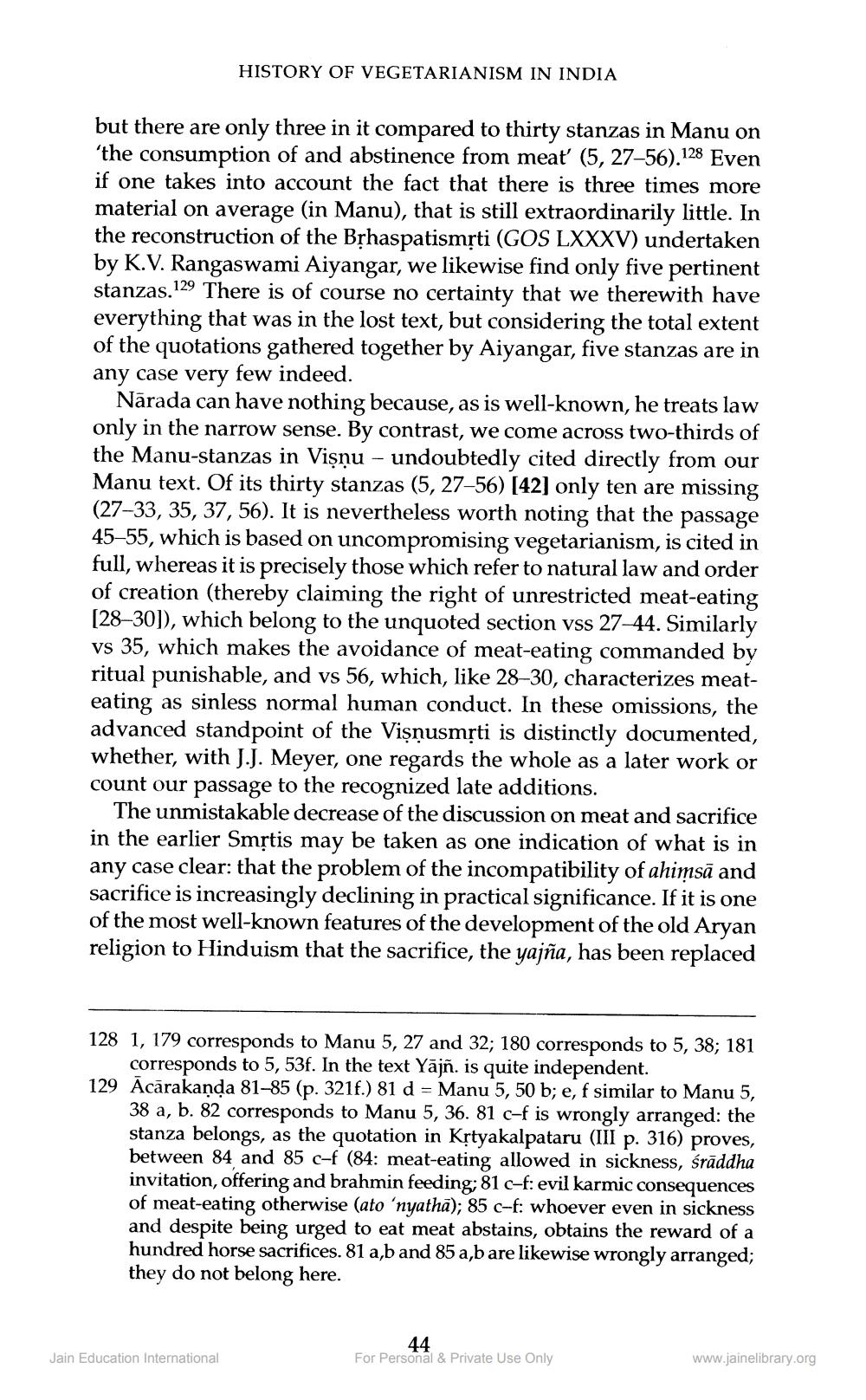________________
HISTORY OF VEGETARIANISM IN INDIA
but there are only three in it compared to thirty stanzas in Manu on the consumption of and abstinence from meat' (5, 27-56).128 Even if one takes into account the fact that there is three times more material on average (in Manu), that is still extraordinarily little. In the reconstruction of the Bịhaspatismộti (GOS LXXXV) undertaken by K.V. Rangaswami Aiyangar, we likewise find only five pertinent stanzas. 129 There is of course no certainty that we therewith have everything that was in the lost text, but considering the total extent of the quotations gathered together by Aiyangar, five stanzas are in any case very few indeed.
Nārada can have nothing because, as is well-known, he treats law only in the narrow sense. By contrast, we come across two-thirds of the Manu-stanzas in Vișnu - undoubtedly cited directly from our Manu text. Of its thirty stanzas (5, 27–56) [42] only ten are missing (27-33, 35, 37, 56). It is nevertheless worth noting that the passage 45–55, which is based on uncompromising vegetarianism, is cited in full, whereas it is precisely those which refer to natural law and order of creation (thereby claiming the right of unrestricted meat-eating [28–30]), which belong to the unquoted section vss 27–44. Similarly vs 35, which makes the avoidance of meat-eating commanded by ritual punishable, and vs 56, which, like 28–30, characterizes meateating as sinless normal human conduct. In these omissions, the advanced standpoint of the Vişnusmrti is distinctly documented, whether, with J.J. Meyer, one regards the whole as a later work or count our passage to the recognized late additions.
The unmistakable decrease of the discussion on meat and sacrifice in the earlier Smộtis may be taken as one indication of what is in any case clear: that the problem of the incompatibility of ahimsā and sacrifice is increasingly declining in practical significance. If it is one of the most well-known features of the development of the old Aryan religion to Hinduism that the sacrifice, the yajña, has been replaced
128 1, 179 corresponds to Manu 5, 27 and 32; 180 corresponds to 5, 38; 181
corresponds to 5, 53f. In the text Yājñ. is quite independent. 129 Ācārakanda 81-85 (p. 321f.) 81 d = Manu 5, 50 b; e, f similar to Manu 5,
38 a, b. 82 corresponds to Manu 5, 36. 81 c-f is wrongly arranged: the stanza belongs, as the quotation in Kętyakalpataru (III p. 316) proves, between 84 and 85 c-f (84: meat-eating allowed in sickness, śrāddha invitation, offering and brahmin feeding; 81 c-f: evil karmic consequences of meat-eating otherwise (ato 'nyathā); 85 c-f: whoever even in sickness and despite being urged to eat meat abstains, obtains the reward of a hundred horse sacrifices. 81 a,b and 85 a,b are likewise wrongly arranged; they do not belong here.
44
Jain Education International
For Personal & Private Use Only
www.jainelibrary.org




